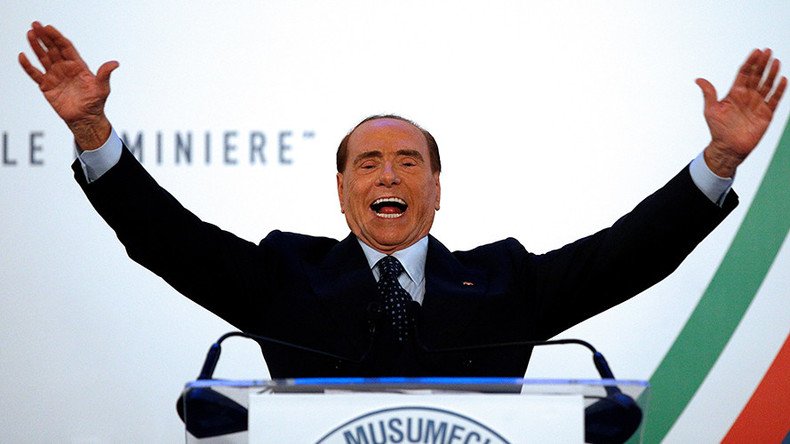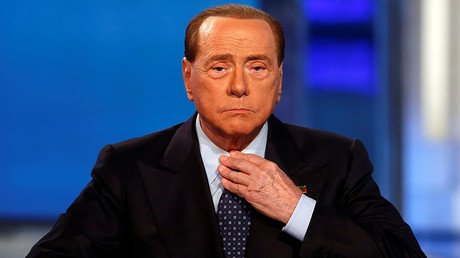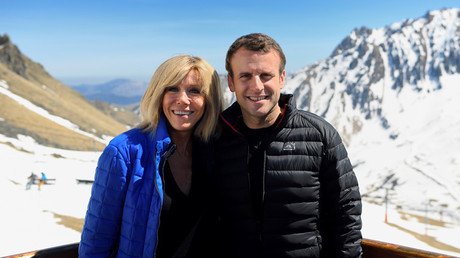‘Here I am!’ How four-time Italian PM Berlusconi is making surprise political comeback

The sweeping victory of a center-right bloc backed by Silvio Berlusconi in Sicily’s election may signal the return of the four-time Italian Prime Minister – once at the center of graft allegations and bunga-bunga scandals – from his political hiatus.
“Sicily, just as I asked, has chosen the path of real, serious, constructive change, based on honesty, competence and experience,” the 81-year-old Berlusconi declared after his rightist Forza Italia bloc claimed an unexpected victory in regional elections held Sunday. Nello Musumeci, Forza Italia’s candidate for governor of the island, garnered 39.9 percent of the vote, while Giancarlo Cancelleri of the anti-establishment Five-Star Movement took 34.6 percent. Fabrizio Micari of the ruling Democratic Party led by former PM Matteo Renzi was lagging far behind on 18.5 percent.
The Sicily election result is a further blow to the ruling center-left government which is already haemorrhaging popular support over its immigration policy. Berlusconi’s allies – the Brothers of Italy and the right-wing, nationalist Northern League – pushed for nationwide anti-immigrant campaigns, making sure the issue remains high on the public agenda. The tactic seems to have paid off handsomely. The steady influx of migrants into Europe, many of whom landed in Italy, caused the public to direct their anger at the centrist government's perceived pro-immigrant policies and the EU’s relocation quotas.
Italy, especially its famous island of Sicily, serves as a gateway for most migrants descending on European shores in search of asylum or a better life. The UN’s International Organization for Migration (IOM) estimates that 154,609 migrants and refugees entered Europe by sea in 2017 through November 5, with about 75 percent disembarking in Italy. In September, a survey by the Milan-based Jewish Contemporary Documentation Centre (CDEC) and an IPSOS poll found that seven out of ten Italians believed there were too many migrants in Italy, while 67 percent thought that “a strong leader is needed to defend the [Italian] people.”
The Sicilian election victory will surely boost Berlusconi, who, already this summer, stood poised for a stunning political comeback. “Here I am!” he told leading newspaper Corriere della Sera in late June, announcing the start of Forza Italia’s political campaign. The veteran politician said at the time that his rightist bloc was able to win people’s voices. “The wind is back in our direction,” he said.
Berlusconi has a reputation of being extravagant both at home and abroad. He was always blunt in his criticism of European bureaucracy, sometimes stopping short of open insults. “I know there is in Italy a man producing a film on the Nazi concentration camps,” he told Martin Schulz, now leader of Germany’s Social Democrats, back in 2003. “I would like to suggest you for the role of leader. You’d be perfect.”
However, his support drained as Italy began to bear the brunt of the Eurozone debt crisis, peaking in early 2010. Amid accusations that he paid for sex with an underage Moroccan dancer and after losing his parliamentary majority, he resigned in 2011. The flamboyant politician was also found guilty of tax fraud and sentenced to prison, but was granted a statute of limitation acquittal following an appeal. Ridiculed in the mainstream media, he’s been considered a lame duck since his fall from the summit of power.
Berlusconi returned to public life after open-heart surgery last year and campaigned actively in Sicily, accompanied by his 32-year-old girlfriend Francesca Pascale. Berlusconi’s revival as one of the figureheads of contemporary Italian politics has been a surprise for many. At home, his critics wondered: How could a politician at the center of countless sex scandals and tax fraud allegations make a political comeback?
Beppe Grillo, leader of the populist anti-establishment Five-Star Movement, even joked last month that Berlusconi was something of a political mummy making a grim impression. “I’m sorry to see him like this, he looks like Tutankhamun, it’s chilling,” he mocked.
Italian politics, though, is tricky, unpredictable and filled with Machiavellian flavors, even in quiet times, and now sees an unusual situation where its heavyweights are either out of office, or barred from running for office. Berlusconi cannot attempt a fifth term as Prime Minister because his tax fraud trial barred him from engagement in political activities.
But it is too early to predict his demise as a statesman – the European Court of Human Rights is expected to start hearing his appeal against the ban later in November.














